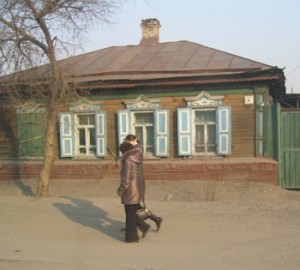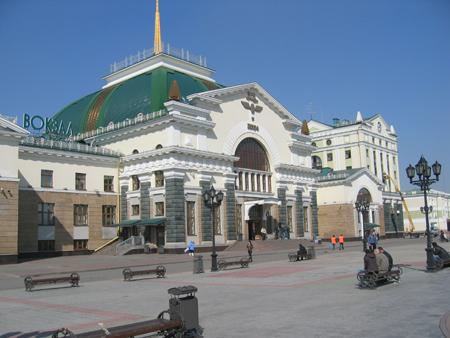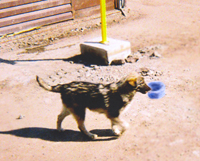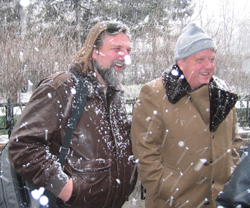We do a concert at the extreme
Siberian outpost, Chita, after which
we do a turnaround and head back to
the west. Chita is pretty shabby.
There is a forest fire somewhere in
the far distance and the air is full
of smoke. It’s hard to breathe. This
is deep southern Siberia due north
of Beijing, China. I look at the
place, fascinated. Generations of
people have built their own wooden
houses. There are many thousands of
them, maybe hundreds of thousands,
all over Siberia. Mostly they are in
bad shape—some are made of logs cut
from the Russian forests which still
cover millions of square miles.
“The birch trees,” they say, “They
are Mother Russia to us.” Their
straight white trunks form banks
across distances so vast, that in
times before automated travel the
land could barely be crossed.
No shortage of timber here, I think,
and in Chita and in hundreds of
other Siberian towns they make log
cabins of them. They still do. The
roofs are tin-corrugated mostly, but
some have standing seam tin roofs,
so prized back in Texas.
Our hotel is not much. It sort of
has the basics in that it’s only a
little dirty. The doors do close and
lock. Behind the building, a power
generator or something is running on
a gasoline engine which revs up
about once every 30 seconds, making
it difficult to sleep. None of the
hotel deficiencies bring complaints
from our seasoned pro musicians,
except in the bathroom where we find
brown water. I decide it must be
full of rust and set it running for
half an hour. It never clears. Ah,
well…it is at least warm. I go ahead
with a brown water shower.
That afternoon at Chita, Morpheus
claims the attention of the
bandsmen. Valeri and I head off to a
press conference. As we enter I see
a bank of microphones on a table,
two chairs and two bottles of water.
All is similar to the previous
conference, except that there is
quite a bank of reporters. As we
enter they erupt in applause. We
take our seats. I try to disguise my
silent counting of them. There are
40 or so on hand!
As we set up the stage, I meet an
interesting native who is in charge
of the stage workers. I have heard
about him from Valeri. He is a
musician, a drummer. He has no
hands, only stubs and parts of
hands—not enough, it would seem, to
take hold of a drum stick. Still
somehow, Valeri says, he does it. I
notice that he limps. His feet are
just stubs too. They are hidden by
his shoes.
The acoustics at Chita are the best
of any place so far. So is our
concert. The hall seats only 500.
Extras squeeze in and stand around
by the open side doors.
I hear the bite of the cornet coming
back while the rhythm section is
exactly together. I know that’s the
key. If the rhythm is exactly
together everything flows, and on
this night we play our very best—I
play my very best. Only two hours
sleep, but almost all of the time on
this night I’m thinking, “I wish I
had a recording of that solo, that
piece.” That is often in my head on
such nights, because it’s hard to
capture the band playing at its most
inspired. My old theory about sleep
being so critical is challenged.
The distances are enormous. We fly back west 2.5 hours to the city of Krasnoyarsk, where a magnificent train station stands proudly. We are five hours ahead of our train and sit around, wander around town a little, eat a little, laugh a lot.
There’s a little grocery store next
to the station. Four of us go over
and buy a few things. As we’re
coming out we see a dog walking back
and forth carrying his bowl in his
mouth. I walk back to look for a
little food to help him out, but
there is a line now in the store.
When I come out again he and his
bowl have disappeared.
We have compartments on the famed
Trans-Siberian Railroad. To the
others it offers an ordeal,
something to be dealt with. They
take it in good humor. For me it is
luxury. I enjoy train travel.
We roll past huge numbers of even
smaller handmade wood houses. There
are miles and miles of them. I don’t
see any people. More and more houses
but no people and no cars.
What goes? The houses go on and on.
Each has its own garden, worked and
ready for spring.
Finally I learn they are “summer
houses.”
In the communist days the government
would provide the land almost for
free. People would have a
“cliff-dweller’s” apartment in town,
but eventually the summer would come
and they would have the reward—the
summer house.
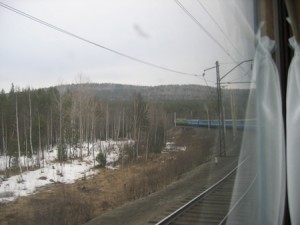
The view from our car aboard the Trans-Siberian. Melting snow among the birch trees meant lots of standing water and mud. Notice the overhead wires: the railway operates on an electrical drive system for all of its thousands of miles.
“What kept them from just moving
there?” I ask.
Answer: “The government didn’t allow
them to be heated.”
“Could they sell them?”
“Yes, but with many restrictions.
Mostly they could only be sold to
retired people. Or, if the owner was
a teacher, he could sell it to
another teacher. Now, they may do
whatever they wish. Heat them up,
sell them, use them winter or
summer. But the old patterns mostly
remain.”
The concerts roll on. Always the
surprised audience that goes into a
kind of ecstasy; the sustained,
sometimes rhythmic applause, the
calls for encores.

The band in Red Square, at the Cathedral of St. Basil. Click on image for larger version. L. to R.: Jim Turner, Mike Waskiewicz, Valeri Grohovski, Jim Cullum, Howard Elkins.
We see more of what we’ve always
seen in the music business: great
contrasts. Of course here we see the
contrast of the Russian Bear, with
the scars of the communist years
showing.
All this is changing, and especially
in Moscow there are displays of the
new Russian wealth. The place might
best be described as a poor man’s
Paris. Its center is filled with
grand boulevards and architecture
and little old-looking charming
streets, shops, cafés, all set among
the famous onion-domed churches. The
domes are here and there, all around
and are freshly restored and
repainted.
The people are stylishly dressed and
handsome. I am told that the rate of
change is so fast that it may be
felt month to month. I also notice
that as they build new buildings in
downtown Moscow, someone is paying
attention, for the new blends with
the old very effectively.
A huge problem in Moscow is traffic.
It seems everyone is now able to buy
a car. The traffic crawls toward
gridlock. Bentleys and Rolls Royces
are sprinkled among the regular old
Toyotas, Hondas, Jaguars, Lexuses
and BMWs. Of course there are some
old junkers wheezing along, too.
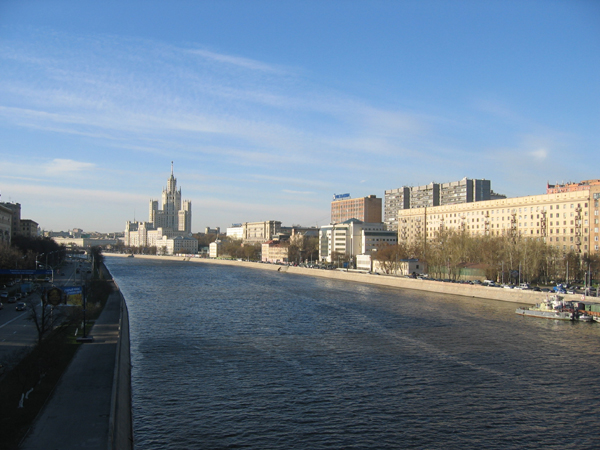
Moscow River city skyline. The building with the tall spire in the distance is Valeri's apartment building.
We walk along the Moscow River. It runs through the city center, a bit like the Seine—past the high-powered concert hall where we will play the following night. A large billboard poster with a full color photo of our band hangs over the entrance. It is inscribed in huge red Cyrillic letters which translate to “Jim Cullum Jazz Band Appearing Here April 6th.”
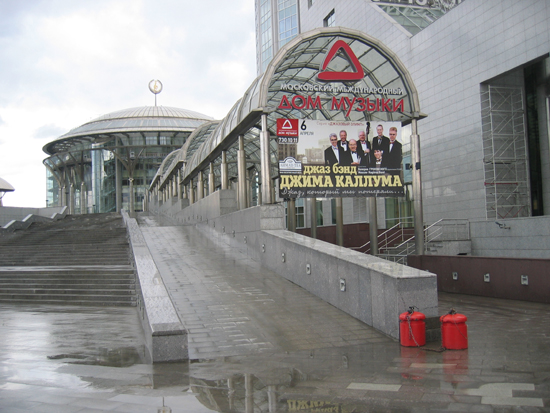
Moscow Performing Arts Center entrance to Dom Muziki ("House of Music"). The large caption at the bottom of the poster reads "Jazz Band Jim Cullum."
We walk on to a very excellent,
well-appointed and elegant
restaurant. As we enter I notice a
table of sophisticates, many of them
young and handsome, many of them
with cigarettes in their hands.
We ignore the smoking. I especially
remember all those early days at the
Landing, when the smoke was so thick
it would sting your eyes. We used to
joke that you could take a big knife
and cut a square of it, carry it
outside and watch it blow away.
Outside, beautiful snowfall begins
and delights us as we walk from the
restaurant to Valeri’s apartment.
The flakes are fluffy and light and
come faster. We throw a few
snowballs back and forth. There are
no direct hits.
Valeri proves himself to be a master
of charm over and over as he
arranges details, getting
cooperation from officials, airport
workers and supervisors, that would
seem quite impossible. Usually he
finds some common bond of
friendship. On one occasion, after
he has discovered that several
airline big shots attended the
Moscow Conservatory of Music, he is
off to join them in a back office
for vodka and
hors d'oeuvres that he
quickly and magically has produced.
The bottles quaffed, the brass
emerges with him, all smiles. We are
hustled right through security, and
most of us are moved up to business
class. We murmur among ourselves,
“Look at him go, he’s good!”


